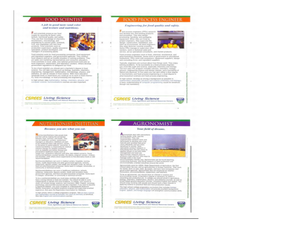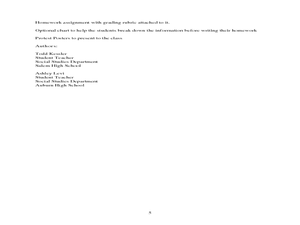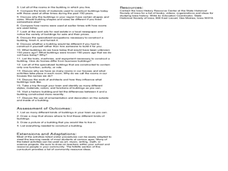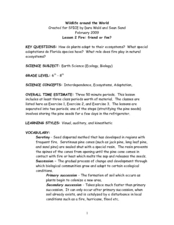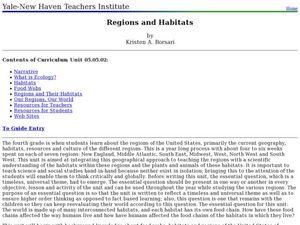Curated OER
The Little Ice Age
In this Little Ice Age worksheet, students read about changes in weather and temperature resulting in changes in rain fall and glacier movement. Students answer three critical thinking questions about the Little Ice Age that occurred as...
Curated OER
Water 1: Water and Ice
Young scholars examine the changes as water goes from solid to liquid. In this states of matter lesson, students observe and record the changes to water as it changes from solid to liquid and back to solid.
Curated OER
Forest Succession
Students research environmental change and why forests cannot stay the same for long. In this environmental growth lesson, students discuss the life cycle of a tree and examine tree cookies to discover the age of these specimens....
Curated OER
Classroom Meteorologists: An Experiential Approach to Learning about Seasons and Weather
Students examine several concepts about weather in the seven lessons of this unit. This year long activity helps students to gather data seasonally about wind, clouds, precipitation, and temperature. Earth's three climate zones are...
Curated OER
Can We Be Both Conservationists and Consumers?
Students explore their role as consumers and conservationists and what roles they play in today's economic climate. They explore resource allocation issues. Students analyze data and draw comparisons between historical and present-day...
Curated OER
Water, Water Everywhere?
Students discover the relationship between water availability and population growth. They change variables in a computer model using a worksheet to guide their hypotheses and conclusions. In small groups they choose a country undergoing...
Curated OER
Michigan Food: From Farm to You
Students recognize Michigan on a map and understand how its climate is affected by the Great Lakes. In this Michigan food lesson, students play a trivia game to identify the produce of Michigan. Students relate the climate in each part...
Curated OER
Panther Trivia Pursuit
Sixth graders design trivia game about panthers. For this panther trivia game lesson, 6th graders use the Internet to research interesting information about panthers, write the facts on note cards, and create a game based on the ...
Curated OER
Greenhouse Gases: The Chemistry Behind the Culprits
Ninth graders investigate the effect of different gases in the atmosphere. In this chemistry activity, 9th graders explain how these gases contribute to global warming. They suggest possible solutions to this growing problem.
Curated OER
Scientist Tracking Network
Learners correlate surface radiation with mean surface temperature of several geographic regions. They observe how these parameters change with latitude and construct an understanding of the relationship of solar radiation to seasonal...
Curated OER
Migrate, Adapt, or Hibernate
In this migration and hibernation worksheet, learners read a 2 page informational excerpt about animals who adapt to changing seasons by migrating or hibernating. They then use the information they learned to answer the 15 questions on...
Curated OER
Careers and Weather
Students appreciate that many jobs are affected by the weather. In this weather and jobs worksheet students complete a worksheet explaining how various workers make changes in their routines due to weather.
Curated OER
1968 – A Generation in Revolt
Tenth graders compare and contrast the revolts that took place around the world in 1968. In this global studies lesson plan, 10th graders research the youth revolts that took place in Paris, Prague, and Chicago in 1968 and create posters...
Curated OER
The Cherokee: Trail Where They Cried
Students read the Trail of Tears about the Cherokee Nation removal and write a letter pretending they are the grandparent of a Cherokee child. In this Trail of Tears lesson plan, students understand the changing of boundaries.
Curated OER
Nomad Land
Students explore the migratory movements of animals as they monitor their own movements throughout the school day. Climatic and feeding conditions are examined as cues for the movement.
Curated OER
Shifting Coastlines
Learners study North Carolina's changing coastline during the Paleoindian and Archaic periods and determine the positions of the coastline at different times and decide what types of archaeological information has been lost due to rising...
Curated OER
Creeping Sheets of Ice
Young scholars conduct scientific investigation in which they observe glacial
effects on landscape, develop and explain their own theories of how glaciers change land, and demonstrate understanding and explain basic motion and force...
Curated OER
Pangaea Puzzle Pieces
Students i examine 10 pieces of evidence for the Pangaea theory and use them to reconstruct the super continent. They determine that land masses on Earth are slowly changing shape as a result of moving for millions of years.
Curated OER
Sedimentation in the Grand Canyon
In this sedimentation worksheet, students use the current rate of sediment deposit by the Colorado River in the Grand Canyon to answer questions about the changes taking place in the canyon. They graph the amount of deposit over 75 years...
Curated OER
Housing: Types of Shelters
Learners experiment with the construction of shelters and the various types of architectural designs. In this shelters lesson, students draw the building they live in. Learners compare and contrast buildings made today and made 150...
Curated OER
Wildlife Around the World
Young scholars examine how plants are able to adapt to their ecosystem and the role that fire plays in changes through the years. In this ecosystem lesson students complete several exercises focussing on plants and their adaptations to.
Curated OER
Regions and Habitats
Fourth graders identify the different habitats found in the seven regions of the United States. In this ecology lesson, 4th graders write an essay about how humans affect the ecosystem and vice versa. They discuss how changes on one...
Curated OER
Ecosystem In A Bottle
Ecosystem activities show how everyone and everything is interconnected. The smallest change can make a big impact.
Curated OER
The Geophysics And Cultural Aspects of the Greater Antilles
Students determine location by using longitude and latitude. They measure to the minute longitude and latitude of a place and select a body of land and determine its location. They approximate time zones by using every 15 degrees of...
Other popular searches
- Global Climate Change
- Global Climate Change Arctic
- Global Climate Change Ice
- Weather and Climate Change
- Global Climate Change Asia
- Climate Change Activity
- Global Climate Change Debate
- Climate Change in Canada
- Oceans and Climate Change
- Climate Change Policies
- Past Climate Change
- Climate Change Mechanisms








